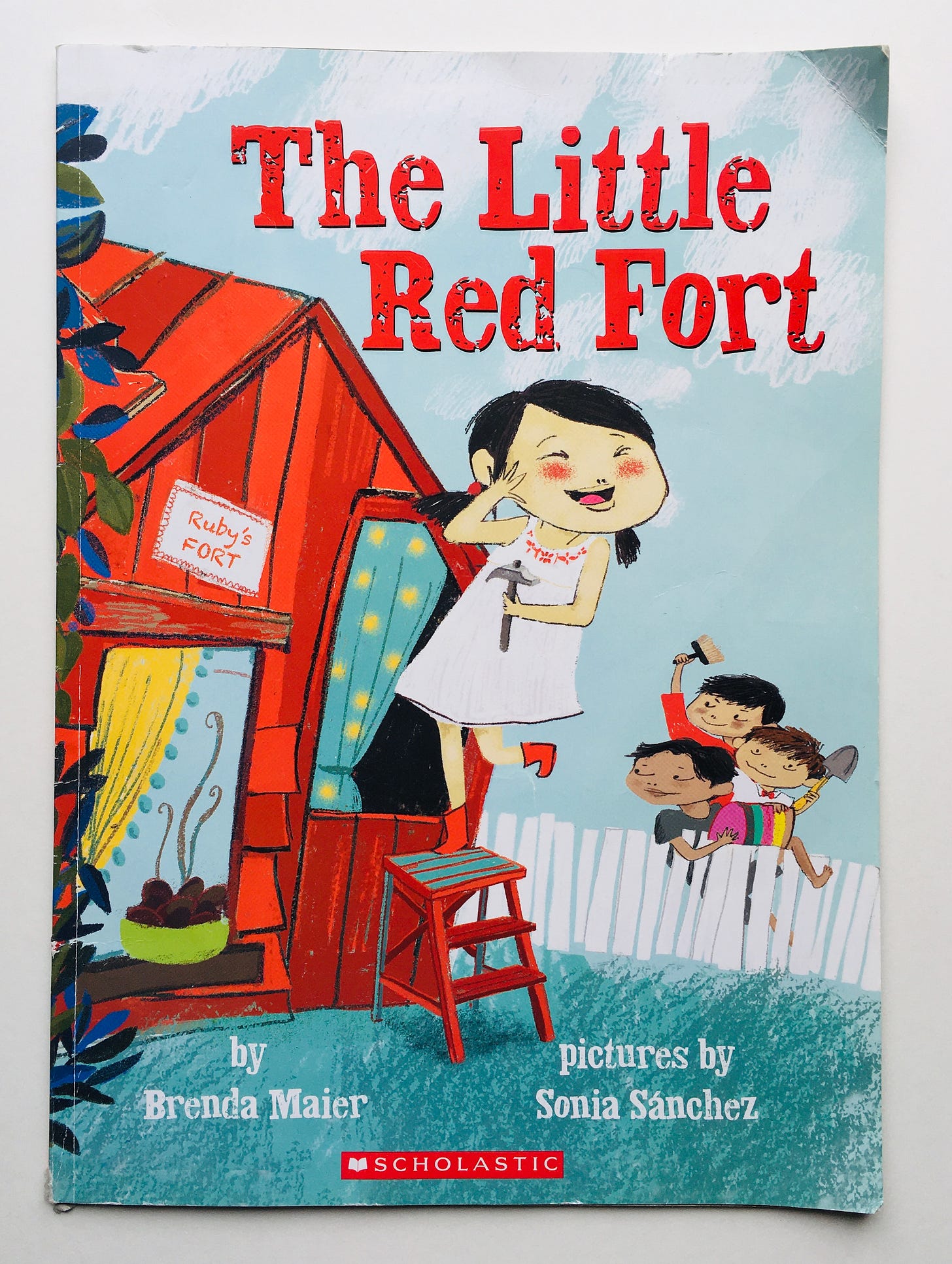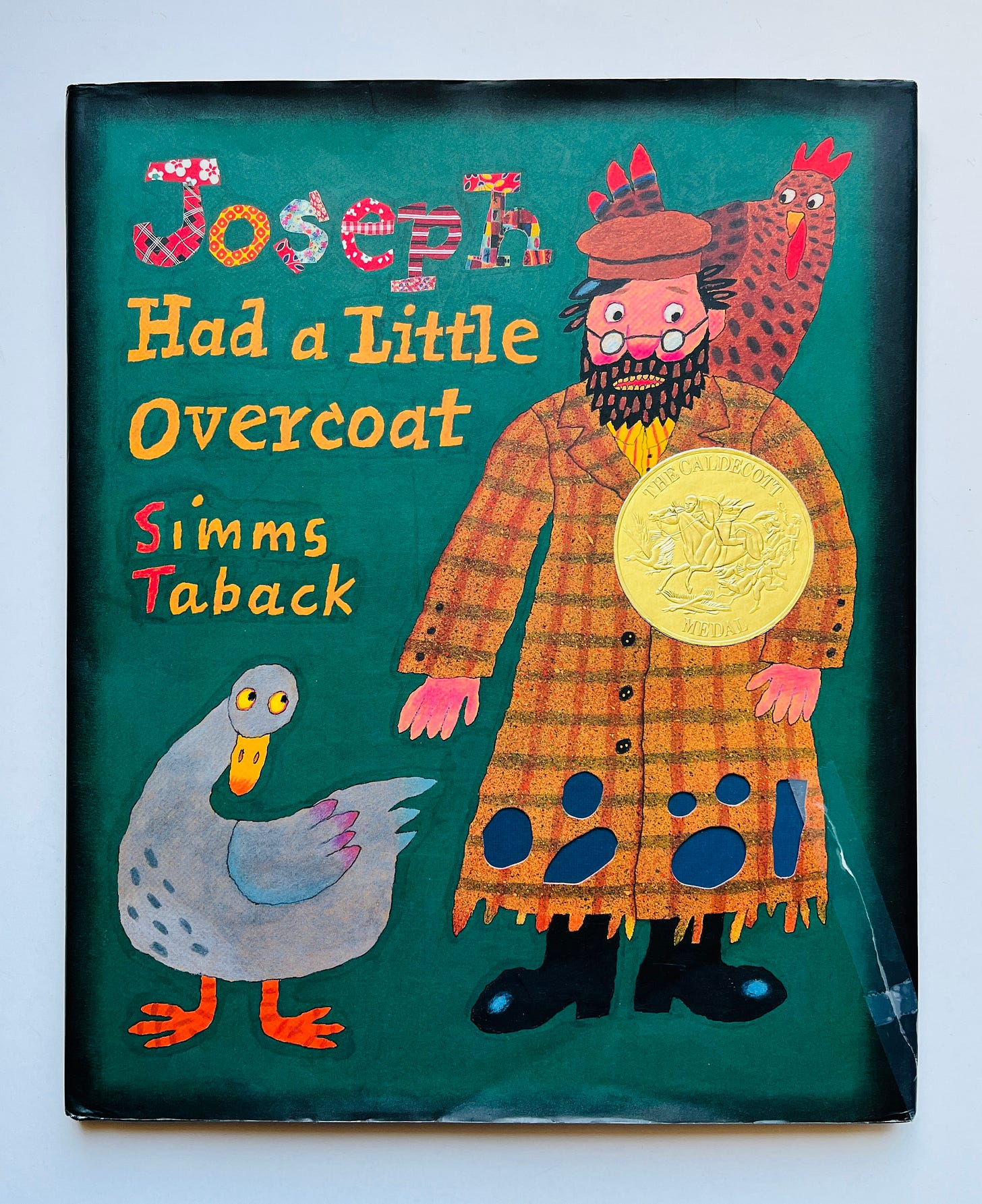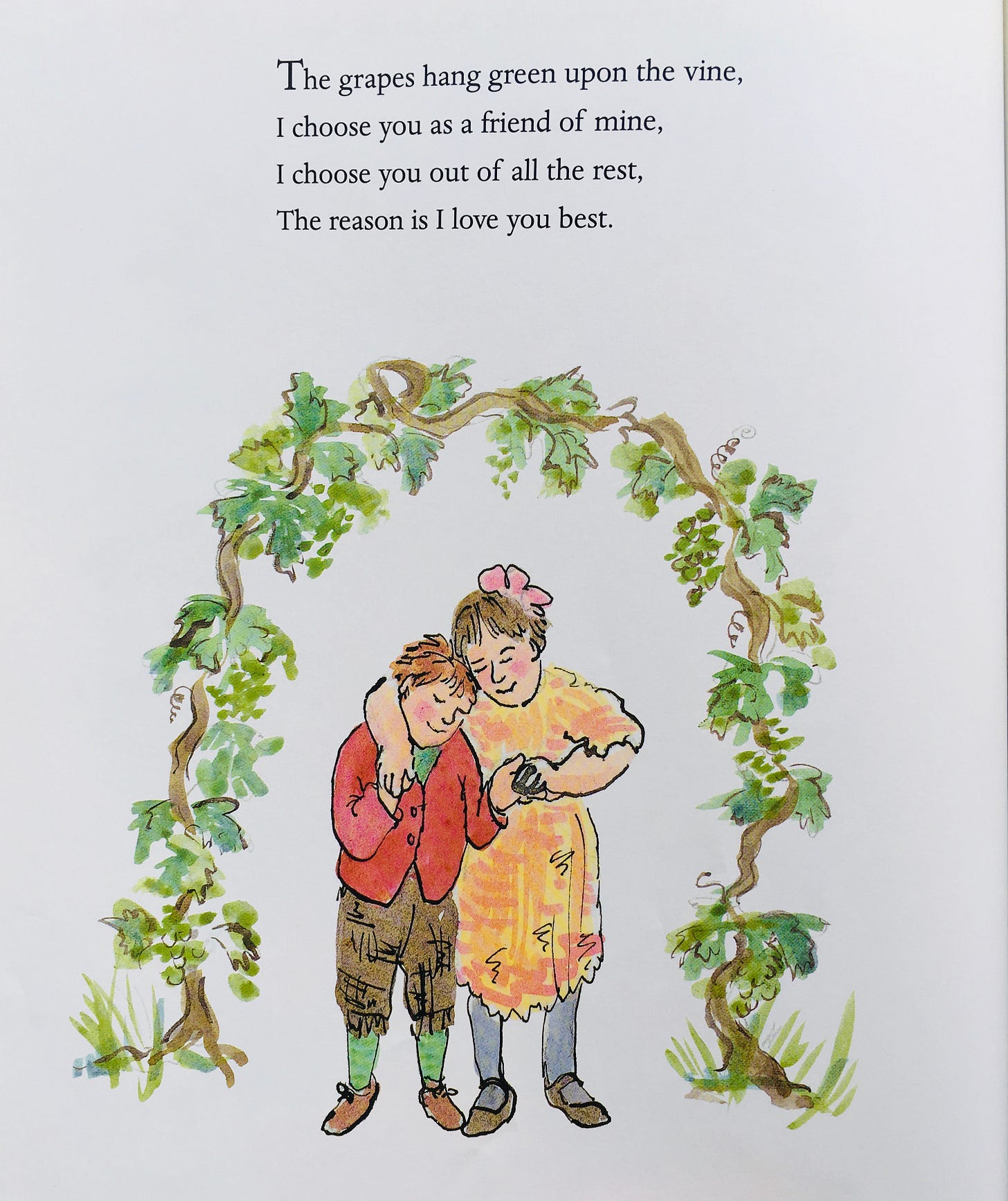Not for the first time lately, I messed up my own schedule — Right this very moment, I’m either lying on hot sand, swimming in a cenote, or walking around some Mayan ruins with my mouth hanging open in wonder and awe. Whatever it is I’m doing, I’m off for a whole week experiencing full-body joy and rest for my soul, so I won’t be responding to comments or emails, but I am sending lots of good energy — always! — your way 💖✨
The Little Red Fort by Brenda Maier, illustrated by Sonia Sanchez (2018)

“The Little Red Hen” is a classic folktale for a reason — it’s a teaching story with a good wholesome moral, told in a repetitive way that makes it satisfying for children and adults alike. But the traditional ending has always bothered me — when the hen’s companions ask her for some of the bread that she has worked entirely on her own to make, without the help they have repeatedly denied her, she refuses them, telling them curtly, “No, I will eat it myself.”
It’s not that she’s wrong, exactly — it’s clear to even a child (and that’s the point, of course) that if you aren’t willing to do the work, you don’t deserve to reap the rewards — but something has just been missing for me there, a lack of resolution. When I found Brenda Maier’s retelling a few years ago, it was a relief to see that her spin on this tale solves the problem of the ending so beautifully.
Here, a little girl named Ruby has an idea to build a fort. She asks her brothers to join in, but they refuse: “‘Not me,’ said Oscar Lee. ‘I don’t think so,’ said Rodrigo. ‘No way,’ said José.” So she ends up doing everything herself. But instead of the terse, though deserved, ending of old, Maier’s revision is filled with self-reflection, gestures of repair, forgiveness, and real resolution for everyone involved.
The other ways that Maier swerves from tradition here are refreshing as well: Ruby’s family is Latinx, and it’s her mother and grandmother who help her with the more challenging aspects of the woodworking. Sánchez’s bright-colored, rough-edged modern illustrations add to the fresh-twist feeling. All that combined make this an outstanding — dare I say even better than the original — title.
Joseph Had a Little Overcoat by Simms Taback (1977)
Though I always hesitate to review fairly well-known titles — you don’t need me to tell you about books you already know about — sometimes there’s one that’s just so good, I worry more that someone will miss it, and that, my friends, is this one.
Never mind that it’s nearly 50 years old: Taback’s creativity and skill in telling the story of Joseph, a resourceful man who turns his worn-out overcoat into smaller and smaller garments. This is a classic tale based on a Yiddish folk song — in fact, I reviewed another excellent version of the same once upon a time — but what elevates this to another level entirely is Taback’s vibrant, layered illustrations and clever die-cut pages, which make it extremely fun and engaging for kiddos, especially when they are still at the age where they like to touch and poke fingers through the spaces in the pages.
If you want a title that celebrates the idea of making the most out of what you have — a message that never gets old, in my opinion — and might forever be on your shortlist of ones your toddlers simply cannot not get enough of, like mine, don’t miss this.
Dominic by William Stieg (1972)

I can never say enough good things about William Steig who was, at the very least, some kind of genius — find me a children’s author who uses richer vocabulary (I mean it, if you know someone, tell me!) — but I will keep trying.
If you want a gentle but entertaining and wildly goofy adventure story about a dog who sets off on a long journey, comes into an unexpected fortune, and then spends the rest of his travels giving it away (all while dodging the Doomsday Gang, a rough crew of woodland baddies who are totally dedicated to whupping the indomitable Dominic, but are none too smart), look no further. Here’s your book.
This is a fun story, with new characters and fresh wackiness in each chapter, and will appeal to wide range of ages, preschoolers through middle school. (If you need a read-aloud that pleases different ages, this one is worth trying!)
You can never go wrong with Steig.
Some From the Moon, Some From the Sun: Poems and Songs for Everyone by Margot Zemach (2001)

If I have not already made it clear, from the million times I’ve pushed poetry on you, not to mention written about its myriad benefits for children, I truly believe we need poetry, and I really mean need it, to make sense of our world, ourselves, and each other.
Couple that with anything written or illustrated by Margot Zemach — I’ll buy any book of hers, sight unseen — and I can highly recommend Some From the Moon… as a great place to start (or keep going!) sharing poetry with toddlers and preschoolers.
This is a book of nursery rhymes, but don’t let that disguise its merits: not only are the poems here lesser-known than many classics (like, say, Hickory Dickory Dock or Baa, Baa, Black Sheep) Zemach’s illustrations are characteristically detailed, expressive, and warm. Reading this is like sitting in the sun on a spring day when the grass has suddenly become green overnight. You know that day — satisfying for all ages, in the most welcome way.
One of the main reasons I shifted to a donation-based subscription model for this newsletter last fall is because I wanted the work I do here to reach as many people as possible — when there’s no paywall, anyone can read it. If you want to help me in this endeavor, the best thing you can do is forward or share this with someone who might like it — a friend, educator, librarian, neighbor, coach, therapist, enemy, whoever! 📤
Your support truly helps.
Sarah






Always surprised at Disney 's SHREK. It started out as a 32 page picture book, and exploded into so many musical films. Those who watched the movies didn't know about William Steig.
If we all started sending our enemies book lists, perhaps they would become kinder! Thank you for the recs and I hope you have a relaxing trip!